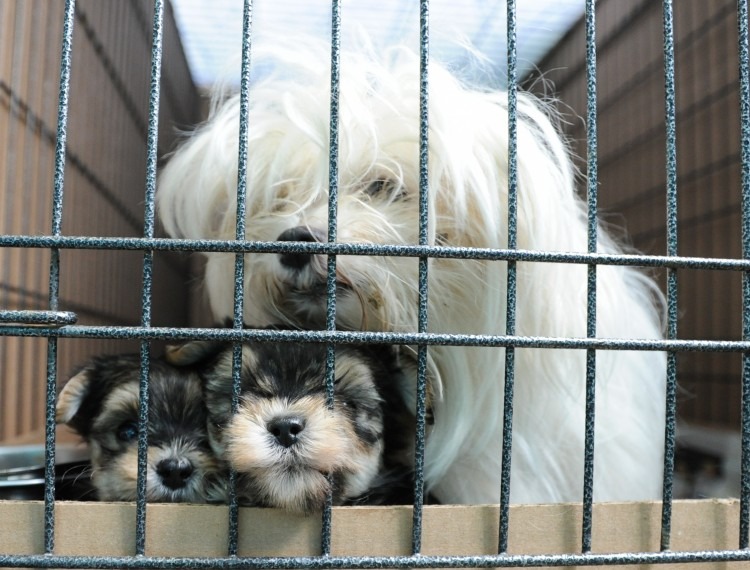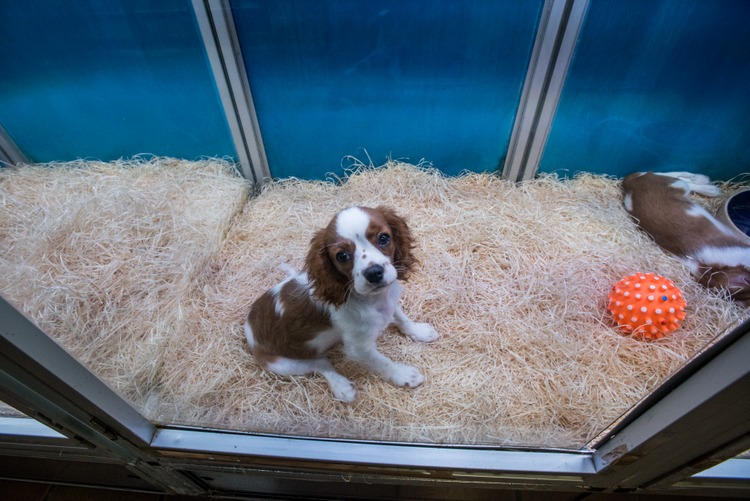In September 2020, the horrific death of Strawberry the boxer and her unborn pups triggered a nation-wide call for stronger and more consistent legislation to protect animals in puppy farms. With many Australian states still failing to act, the Animal Law Institute (ALI) in Victoria is using a creative legal solution to hold negligent breeders accountable through the Australian Consumer Law.
Voiceless invited Erin Germantis from ALI to discuss the issue of puppy farms in Australia and the role of their recently established ‘Anti-Puppy Farm Legal Clinic’.
What are puppy farms?
‘Puppy farms’ are intensive dog breeding practices that fail to meet the physical, social or behavioural needs of animals. Also known as ‘puppy factories’ or ‘puppy mills’, they typically involve large, for-profit breeding operations but can also be smaller-sized businesses that keep animals in overcrowded and unhygienic conditions which fail to provide proper care. Puppy farming is an exploitative practice that uses animals as breeding machines, with the intention of producing as many litters as possible within the shortest amount of time, in order to maximise profit.
There are a vast array of welfare issues associated with puppy farms, which differ depending on the circumstances. In some cases, animals can be denied adequate food, water or shelter; in other cases, sick animals are left to languish without veterinary care. Many animals are kept in small cages and are not socialised properly, resulting in extreme anxiety or psychological damage.
Whatever the scenario, poor breeding practices can lead to a variety of health problems in adult breeding dogs and their offspring. Puppies, which at first glance appear healthy, can present with health issues after they have left the breeder to be sold to pet stores, pet brokers or directly to the public.

What does the law say?
Interestingly, there is no legal definition of the term ‘puppy farming’ in Australia. Like anti-cruelty legislation, the laws surrounding domestic animal breeding are set at a state and territory level, and are therefore not consistent across different jurisdictions. Local governments are also part of the management of dog and cat breeding. This lack of consistency means that breeders will be subject to different rules and regulations depending on where they live.
Some states are more progressive than others. In Victoria, those who own between 3 and 10 fertile female dogs who breed to sell are classified as a ‘breeding domestic animal business’. They must be registered with their local council and comply with the Code of Practice for the Operation of Breeding and Rearing Businesses 2014. Those with 11 or more fertile female dogs must seek ministerial approval to become a ‘commercial breeder’ and are only allowed to keep a maximum of 50 fertile female dogs within their business if approved. Pet stores in Victoria have also been banned from selling dogs unless they are sourced from shelters. In an effort to increase traceability, anyone selling or rehoming a dog in Victoria must enrol in the ‘Pet Exchange Register’ so they can be issued with a ‘source number’ which must be included in any pet sale advertisements. While in Victoria the legislative framework is intended to increase the welfare of animals, strong enforcement is essential in ensuring that these laws are complied with.
Over the border in NSW, things look very different. There are no caps on the number of fertile female dogs that a business can own and pet stores are free to source their animals from for-profit breeders. We see a similar situation in a number of other states and territories with inadequate protection measures.
Some traction against puppy farming was gained in Western Australia in 2020, with the introduction of a bill to Parliament to introduce mandatory de-sexing, a ban on the sale of animals in pet shops unless sourced from shelters, and improved traceability. Although the Bill has now lapsed due to the end of a parliamentary session, it’s hoped these important reforms will be reintroduced later this year.
Related Blog: 6 Animal Law Wins That Gave Us Hope in 2020.
In South Australia, the Labor Opposition recently pledged to introduce anti-puppy farms legislation should the party form government at the next state election in March 2022.
The differences in breeding standards between states and territories is a prime example of why Australia needs to coordinate consistent animal protection legislation at a federal level. The lack of a consistent framework creates confusion for companion animal buyers who may not fully understand the conditions under which the animal was born. As a result, they may inadvertently buy their companion animal from a puppy farmer.
The Animal Law Institute – Helping pet owners seek justice
The Animal Law Institute (ALI) recently established an ‘Anti-Puppy Farm Legal Clinic’ to hold negligent breeders accountable for their actions, using the Australian Consumer Law (ACL).
Throughout the COVID-19 pandemic, there has been an increase in the number of Australians buying dogs and cats online, including so-called ‘designer’ breeds. As demand rises, intensive breeders are able to charge exorbitant prices and will often risk animal health and welfare in order to make a profit.

In response, the Anti-Puppy Farm Legal Clinic is providing free advice to the public about how Australian Consumer Law can be used to seek justice on behalf of sick animals if they were acquired from a breeder or pet store.
Related Hot Topic: Puppy Farming
Domestic animals such as dogs and cats are considered property in the eyes of the law, and are classified under the ACL as ‘goods.’ This classification is inadequate as it ignores the sentience of animals by grouping them together with other ‘goods’ such as mobile phones or cars. However, it is this classification that arguably provides an opportunity to hold breeders and sellers accountable. The ACL provides a set of automatic rights, known as consumer guarantees, in relation to any consumer goods or services supplied within trade or commerce in Australia. For example, goods must be of acceptable quality, be fit for purpose, and must match their description provided. Relying on these guarantees, consumers may be able to seek a remedy such as compensation, either against the supplier or the ‘manufacturer’ of a companion animal, such as the seller or breeder of a dog. Similarly, consumers may also be able to seek remedies under the ACL for misleading or deceptive conduct in trade or commerce.
Those who have purchased a sick companion animal and want to understand how the law applies to their particular situation are encouraged to submit an enquiry for legal assistance via the ALI website here.
The Anti-Puppy Farm Legal Clinic is supported by the Victorian Government and is currently open to Victorians, but ALI hopes to expand the service in the future. For more information about the clinic, please contact ALI lawyer Erin Germantis via email. If you would like to learn more about the Animal Law Institute’s work, you can follow ALI on Facebook and Instagram.
 Erin Germantis is a lawyer at the Animal Law Institute.
Erin Germantis is a lawyer at the Animal Law Institute.
She has a background in civil litigation but it was her passion for animal protection that led her to ALI. Erin has previously worked at Lawyers for Animals’ clinic as a lawyer and paralegal, and interned at the office of Australian Greens MP Adam Bandt. Erin graduated with a Bachelor of Arts in 2010, and a Juris Doctor in 2013. After obtaining a Graduate Diploma in Legal Practice, Erin completed a Master of Laws in Human Rights at Monash University, where she also studied animal law as part of her course.
Voiceless Blog Terms and Conditions: The opinions expressed on the Voiceless Blog by guest authors and interviewees are those of the relevant contributors and may not necessarily represent the views of Voiceless. Reliance upon any content, opinion, representation or statement contained in the article is at the sole risk of the reader. Information provided does not constitute legal advice and should not be taken as such. Voiceless Blog articles are protected by copyright and no part should be reproduced in any form without the prior consent of Voiceless.

